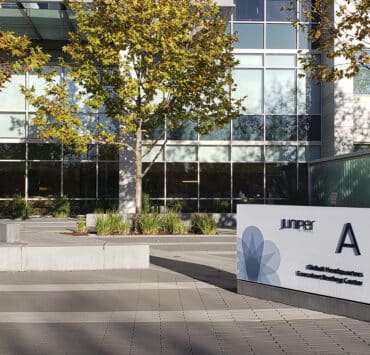|
Getting your Trinity Audio player ready...
|
Jeff Wachs was annoyed. The assistant director of facility operations at Northwestern Mutual could look out his office window and see people stroll up to an electric scooter, tap their phone a few times, and be down the street on two wheels in a minute’s time.
“My boss would laugh at how worked up I got,” Wachs says, chuckling. “But I wanted to know why I could walk out of this building and get on a scooter faster than I can report a problem in our buildings.”

Courtesy of Jeff Wachs
If you haven’t figured it out, Wachs thinks a little differently. Whether it pertains to how businesses approach sustainability initiatives, his own focus on developing his people, or the little things outside of life that spur the executive to find a way to make the office a more comfortable and welcoming place to be—the facilities world could benefit from more people like Wachs.
In this case, the assistant director wanted to find a way to minimize the time and effort required to report issues like food spills, in-room needs, light bulbs that needed replacing, and other facilities requests ranging from the seemingly mundane to requiring emergency responders.
“We’re a Fortune 100 company,” Wachs explains. “And we have this huge system, but it’s a little clunky, a little old, and a little outdated. Depending on the business, you would have to enter a Windows portal, and in some cases, you had to deal with an entirely different internal network.”
Wachs says the time and effort it took to report issues could easily be interrupted or simply forgotten, and he wanted an iOS-based technology that would require a much simpler infrastructure: a phone. “Everyone has a phone. Therefore, everyone has the infrastructure already,” Wachs says. “All you should have to do is tap your phone, take a picture of the issue, and have a back end that can compile those requests in an efficient way.”
Wachs and Northwestern Mutual partnered with mobile facilities management technology company CrowdComfort to pilot a program in 90,000 square feet of Northwestern Mutual’s office space in downtown Manhattan.
The success of the pilot has led to plans of an enterprise-wide rollout in the first quarter of 2022, nearly four million square feet of office space. Wachs will be able to breathe a little easier whenever he sees someone on an electric scooter.
How Sustainable is Your Sustainability?
It’s this sort of atypical approach that has made Wachs both an excellent developer of talent and a strong advocate for what he considers impactful sustainable efforts.
On the development front, Wachs employs the term “harvesting.” “I’ve learned throughout my career to harvest the talents from people who I think will help me to [get] where I’m going,” he elaborates. “It may be a situation or a conversation, but I always have that voice telling me I should remember this and put it to use later on.”
In return for his own harvest, Wachs ensures that those who work on his team can reap their own knowledge. The assistant director sees it as his role to help his team get where they, too, are going. “My job is to train my team to take my job whether they want to or not,” he says, laughing. “Maybe they don’t want it, but by not preparing them for it, I would essentially be telling them that I’m not interested in their own development—and that’s wrong.”
It’s clear that Wachs has strong personal principles that undergird his outlook. For example, when talking about sustainability efforts, Wachs says it’s easy to point to strides Northwestern Mutual has made, but he believes the conversation should be a different one.
“So much of the sustainability talk right now seems to be about checking boxes,” the assistant director explains. “Businesses spend money to get LEED certified, but how are you going to maintain that a year from now? Five years from now? I’m against the idea of paying for credits to get ahead and initiatives that don’t pay attention to the long haul.”
Wachs says the key lies in developing and continually nurturing a broader strategic plan. The change out of leadership can easily reroute sustainability initiatives, and he says facilities leaders need to be keenly aware of priorities that will best keep those efforts on track regardless of short-term goals or box-checking initiatives.
At Northwestern Mutual, Wachs says the company’s resources and commitment to sustainability are looked to as leaders in the space, and it is incumbent on the organization to employ those efforts both in new ways that can push the space forward, but also underline a commitment to real sustainability and long-term results.
“We owe it to people to lead,” he says. “We may try and fail, but we’re going to keep trying. I’m just here to make sure that whatever we try, we commit to it and see it through.”


